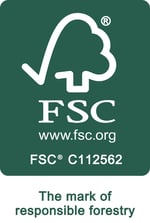Sustainable forest management practices are vital to promoting healthy and abundant forests for present and future generations. Forests regulate our climate, produce oxygen while sequestering carbon, clean the air we breathe, and filter the water we drink. They provide habitat for more than two-thirds of terrestrial wildlife and plants. They are one of our most valuable resources, offering a renewable supply of the materials and goods we need for a more sustainable future.
Dawn of a Global Forest Certification Movement
In 1992, the United Nations convened the Earth Summit in Rio de Janeiro, Brazil (known today as the Rio Summit). The 14-day convention was attended by government leaders of 179 countries. This international conference was intended to address urgent global issues regarding environmental protection and socio-economic development.
At its conclusion, the assembled leaders signed the Convention on Climate Change and the Convention on Biological Diversity. They endorsed the Rio Declaration on Forest Principles and adopted Agenda 21, a 300-page plan for achieving sustainable development in the 21st century.
In essence, the Rio Declaration stated that the only way to have long-term progress is to link it with environmental protection. It further declared this will only happen if nations establish new and equitable global partnerships involving governments, their people, and key sectors of societies.
The Forest Stewardship Council
The Forest Stewardship Council® (FSC®) was established in 1993 after the Rio Summit by representatives of environmental, social, and forest management groups. FSC promotes environmentally appropriate, socially beneficial, and economically viable management of the world's forests.
the Rio Summit by representatives of environmental, social, and forest management groups. FSC promotes environmentally appropriate, socially beneficial, and economically viable management of the world's forests.
Today, FSC continues to ensure that forest management maintains the forest's biodiversity, preservation of wildlife habitats, productivity, and ecology. Balance is advocated — of ecosystem objectives, economic objectives, and the well-being of workers in terms of wages, safety, and inclusion.
FSC is a global non-profit, non-governmental organization and is widely regarded as the world’s most trusted forest certification system. It promotes the management of sustainable forest systems with more than 625,000 square miles of the Earth’s forests being FSC certified. FSC’s forest management certification confirms that the forest is being managed appropriately to preserve biological diversity and benefit the lives of local people and workers while ensuring it sustains economic viability.
Materials used in products bearing the FSC label are sourced from forests that have been audited by an independent third party to confirm they are managed according to FSC's rigorous social and environmental standards. Guidelines are strict when it comes to chemical use in forests, and rules towards forests being converted into plantations.
Annual audits are required to assure the public that landowners are fully committed to an economically viable and ecologically healthy forest. They provide guidelines for performing better in the future and provide individual assessments of their present management.
FSC's Chain-of-Custody Certification
Once a forest has been certified as aligning with FSC’s principles and practices, wood harvested from that forest is deemed certified. FSC’s Chain-of-Custody Certification and product labeling system allows processors, retailers, and consumers to confidently know that their product came from a well-managed forest. With this Chain-of-Custody Certification path taken by raw materials from the forest to the consumer, any FSC-labeled product can be traced back to a certified source, including all successive stages of processing, transformation, manufacturing, and distribution.
While there are other certification bodies, FSC is more transparent, more focused on respecting local communities, has stricter rules to manage and protect the forests, and requires annual audits to make sure that the public knows about the companies that are participating in responsible forestry management.
FSC not only certifies forests demonstrating sound environmental management practices but also mandates human rights as dictated by the International Labour Organization (ILO). The ILO is a United Nations agency whose mandate is to advance social and economic justice by setting international labor standards. Among a host of other things, these standards address suitably remunerated work, safety at the workplace, and social protection. The laws of the United States and Canada meet or exceed all ILO laws.
Editor’s Note: While the above is encouraging, many forest areas, particularly rainforests, are still under attack from illegal logging and other harmful practices with no regard for the health and replanting of the forests. This causes more than 46,000 square miles of forest to be lost every year. Please join Premier Print Group in supporting organizations that promote and lobby for healthy practices in the world’s forests.




